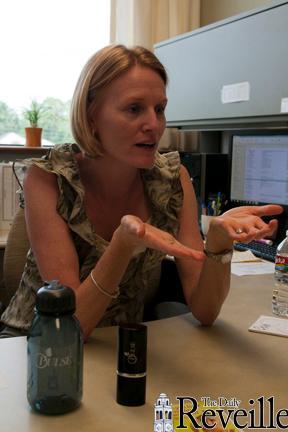When Leanne Redman began her work at Pennington Biomedical Research Center, she studied reproductive problems in female athletes, but this lead her to work in studying different health effects on female reproduction – the first women’s health studies at the center.
Redman explained how during her studies, she discovered a spectrum of women who exhibit reproduction problems as a result of health issues.
“There’s women that are underweight with low body fat that aren’t menstruating,” she explained. “But on the other end of the spectrum you’ve got obesity where we’ve got these menstrual problems related to weight gain.”
Redman began the Reproductive Endocrinology and Women’s Health Lab in September with the goal of using research findings on female reproductive problems to help the community. Redman said applying these studies to the community can ultimately improve the health of the people who live in Baton Rouge – a city she said has the second-highest obesity rate in the country.
“Women are generally the nutritional gate-keepers in the household,” Redman said. “They’re usually the people who purchase the food and prepare the meals.”
Redman explained women make an investment in their family’s health by learning information from Pennington’s programs that they can convey to their families.
“It’s been observed that if a woman enrolls in a program and she’s in that role in her family, it has a ripple effect,” she said. “There’s a positive effect that ripples to other members of the family because they’re learning about how to prepare nutritious foods and things like that.”
Redman said Pennington’s resources allow a mix of expertise in various disciplines that center around similar themes. This ultimately allows multiple steps of research to take place all within the center.
“In theory, what we could do in this particular campus is discover a protein, make a drug, test it in pre-clinical studies and we could then test it in people – and it could go to market,” she said.
“We [Pennington] are well placed to studying how gaining weight and obesity is impacting chronic diseases,” she said. As part of the University’s system, Pennington is the largest academically-based nutrition research center in the world.
“What Toys ‘R’ Us is to a child, Pennington is to somebody that does clinical research,” she said. “We have all the gizmos and gadgets, the bells and whistles, the state of the art facilities to do whatever you want.”
Redman cited two current major projects of her department: Pride, a project to determine the best prevention for women who had gestational diabetes during pregnancy from developing diabetes after they give birth, and Pulse, a mechanistic program to determine preventions for polycystic ovary syndrome – the most common cause of irregular periods, which one-fourth of women exhibit.
In addition, participants in this research not only help examine the causes and preventions for certain health issues, but they can receive information on their personal health. Graduate Assistant Abby Duhé said certain programs allow these participants to view various statistics about their health.
“All these tests we’re doing about your reproductive health – we’re going give you all of the information,” she said. “You may not ever see these tests results, pictures of your MRI, your body composition.”
____ Contact Austen Krantz at akrantz@lsureveille.com
Pennington researches women’s health
July 3, 2012

Assistant Professor Leanne Redman explains the benefits of participating in the clinical programs offered at Pennington Biomedical Research Center.




